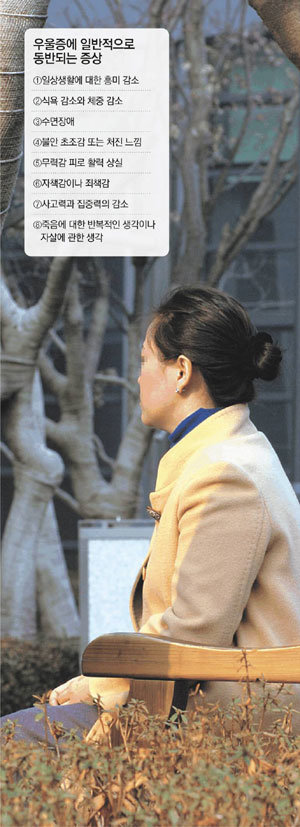Depression

Depression is like the common cold of mental health. People in modern society easily catch depression like a cold. Fifteen out of 100 people develop it at least once in their lifetimes. Fortunately, it is as easily curable as a cold if detected early and treated appropriately.
However, common misunderstandings and prejudice against mental diseases prevent early detection. Many people with depression do not get treatment and let their mental health deteriorate further. A statistic found that around 15 percent of people with depression attempt suicide.
Famous movie star Brooke Shields struggled with depression after giving birth, but recovered with help from her psychiatrist. She even published a book to help women fight against postpartum depression based on her experience. Her being so open about her mental condition shows that prejudice against mental diseases is not as strong in the other side of the Pacific as it is in Korea.
Lack of insulin is the cause of diabetes. Likewise, the cause of depression is lack of neurotransmitters in your brain, said Nam Kung-gi, a psychiatrist at Severance Hospital in Seoul. It is easily treatable if diagnosed early. But it seems Koreans have this psychological resistance to psychiatric treatment, he added. In other parts of the world, on the other hand, people often talk to psychiatrists to discuss various issues in their lives. The mental barrier to the psychiatric treatment is much lower.
Depression is common across the world. Anti-depressants rank among the top ten best-selling drugs globally. These drugs are effective and have few side effects. Koreans do not see depression as a type of disease. They often dismiss it as a lack of willpower or a symptom of mental weakness, said Park Won-myong, neuro-psychiatrist at St. Marys Hospital in Yeouido, Seoul. This being the case, many Koreans with depression often go around from one clinic to another to treat the physical symptoms caused by depression.
People can experience depressed feelings for no reason several times a day. When things dont go the way one wants, or when one has bickered with his or her spouse, many people become depressed. These feelings are not depression, but temporary blues.
These feelings are perfectly normal and anybody can experience them, and they go away in two to three days. But if this mood disturbs your daily life for more than two weeks, you are advised to suspect possible depression.
Some 80 percent of depression cases are treatable with anti-depressants or mental treatment. It usually takes two to three weeks for anti-depressants to take effect, so be patient.
It takes six to twelve months for depressed brains to fully recover. If you stop taking treatment early, depression is highly likely to come back, said Ki Baek-seok, neuro-psychiatrist at Chung-Ang University Medical Center and chief director of Korean Society for Depressive and Bipolar Disorders. Prolonged depression is harder to treat, so you should uproot it in the incipient stage.
If you have depression, go to nearby psychiatric clinic. Any clinic is ok because depression does not require complex treatment.
Depression is also a cause of thyroid disorders, hypertension, or diabetes. You are advised to go to bigger hospital if you have 1) other physical symptoms accompanied with depression, 2) do not see progress after a certain period of treatment, or 3) ever caused injury to yourself or others.
If you still do not feel like trying clinical treatment, a counseling center is another option. The Seoul Mental Health Center runs a 24-hour hotline (1577-0199). The Ministry of Health and Welfare also has a line for depressed or suicidal people (129). Lifeline (1588-9191), an international non-profit organization, also provides 24-hour counseling services for suicide prevention and better mental health.
likeday@donga.com







